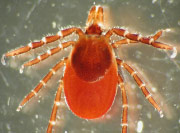Tick IPM #4: Habitat Management for Vector-Borne Diseases
Recorded August 10, 2020
Download presentation slides (PDF, 4.1 MB)
Description

Blacklegged tick. Photo by Lisa Ames, University of Georgia, Bugwood.org.

Dr. Allison Gardner, Assistant Professor in the School of Biology and Ecology, the Senator George J. Mitchell Center for Sustainability Solutions @University of Maine
Dr. Gardner will address the impacts of forest management on tick ecology and tick-borne pathogen transmission dynamics. This will include discussion of invasive plant management, timber harvesting, and prescribed burns as active management tools that landowners can use to inhibit tick-borne disease exposure risk on their own properties, as well as the impacts of these practices and forest fragmentation on tick-borne disease transmission at the landscape scale. She also will talk about her recent research conducted at the University of Maine regarding landowners’ tick-borne disease risk perceptions and willingness to actively manage their forested land in the context of tick-borne pathogen transmission.
Dr. Allison Gardner
Her research focuses on the ecology of infectious diseases of humans and wildlife that are transmitted by arthropod vectors. She uses lab and field studies in conjunction with geographic, quantitative, and molecular tools to address questions related to 1) understanding the basic biology of arthropod vectors and the socio-environmental conditions that enhance disease transmission, 2) developing effective, sustainable vector management strategies that are grounded in ecological theory, and 3) predicting future hotspots of transmission to facilitate targeted public health prevention and intervention efforts. Current projects include studying the invasion of the blacklegged tick and Lyme disease in Maine, investigating the ecology of a mosquito vector for Zika virus in the Bahamas, and understanding the interactions between risk of exposure to vector-borne disease and economic interests (e.g., timber harvesting, tourism) at local and international spatial scales.
